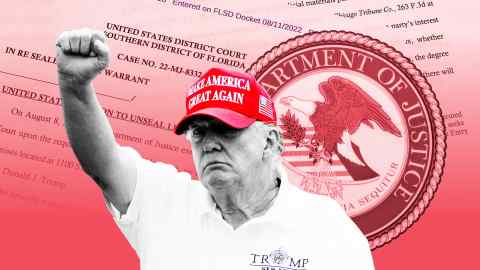
Donald Trump is under investigation for possible mishandling of information related to the national defense of the United States in violation of the Espionage Act, along with other possible violations related to the handling of government documents, according to the order of the FBI to search former president’s home.
The search of Trump’s Mar-a-Lago estate on Monday, which sparked a strong backlash among his political supporters, resulted in the recovery of a large number of classified and highly sensitive documents related to national security , court documents released Friday revealed.
The warrant, which was signed by a federal judge on Aug. 5, asked the FBI to search Trump’s office as well as “all warehouses” and premises used by the former president and his staff
It also asked federal agents to seize “all documents and physical records constituting evidence, contraband, proceeds of crime and other articles” that may have violated the law in any of three possible ways. The first relates to “collecting, losing or transmitting defense information” under the Espionage Act, a serious crime related to national security, while the second and third relate to the removal, destruction, alteration or concealment of federal documents.
The court filing also contained a list of items recovered by federal agents from Trump’s property. This included information related to the “President of France,” the “grant of clemency” for Trump ally Roger Stone, photo notebooks, a handwritten note, and most importantly, a variety of secret and classified documents that require a special government care.
The search warrant underscored the seriousness of the investigation Trump is facing. The FBI and Justice Department had no additional comment beyond the court filing of the search warrant. The DoJ had called for the warrant’s public release, but Trump also supported its release. The order was delivered to his lawyers on the day of the search.
The revelation that Trump had highly classified documents at his Mar-a-Lago estate, including at least one that applied to a foreign leader, will bolster claims by the DoJ and the FBI that they acted appropriately in their decision to register your house.
The Washington Post reported late Thursday that some of the documents were related to nuclear weapons, though the FBI, DoJ and National Security Council declined to comment on that report.
You are viewing a snapshot of an interactive chart. This is likely because you are offline or because JavaScript is disabled in your browser.
In a series of posts on Truth Social on Friday, Trump derided the search and any suggestion of wrongdoing as politically motivated persecution. “The issue of nuclear weapons is a hoax, just as Russia, Russia, Russia was a hoax,” he wrote, referring to the investigation led by special counsel Robert Mueller into Russian interference in the US presidential election. United in 2016 while in office.
Trump also continued to criticize the FBI – “The same brazen people involved” – and said US law enforcement could have obtained the documents at Mar-a-Lago at any time. “All they had to do was ask.”
However, prosecutors had been in talks with Trump and his team for weeks about the importance of producing the documents, to the point where they issued a subpoena earlier this year.
recommended

Even with the release of the search warrant and inventory list, the motivation for the search at Mar-a-Lago will not be fully known until an affidavit in support of the warrant is made public or federal prosecutors file charges.
The DoJ had declined to comment on the Trump investigation for three days after the search, maintaining its policy of not commenting on pending cases. But on Thursday, Attorney General Merrick Garland issued a brief statement after criticism that he had given no explanation for the move.
Garland did not offer any new details of the investigation, but said he had personally approved the search and would not take this step “lightly.” He also fiercely defended the work of the FBI and the DoJ after they became the focus of vitriolic criticism from Trump and his allies on the American far right.
House Intelligence Committee Chairman Adam Schiff, D-Calif., said the documents released Friday suggested the search was justified.
“If the reports are accurate and contained among these documents is some of the most highly classified information our government has . . . then it would explain a lot about why the department and the FBI took the step of obtaining a warrant to retrieve the documents,” he said. “Every day that this classified information is in an insecure place is a risk to our national security.”
But Republicans remained hesitant. “Where is the affidavit? We have yet to see the affidavit,” tweeted Lindsey Graham, the Republican senator from South Carolina.
[ad_2]
Source link


